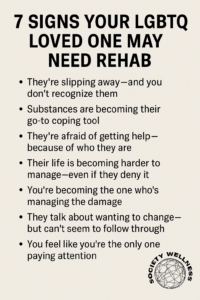When someone you love is struggling, you feel it in your gut—even when you can’t explain it.
It starts as a quiet worry. They cancel last minute, seem foggy when you talk. You tell yourself they’re stressed. Busy. Just going through something.
But deep down, a different voice whispers: This isn’t just a phase. Something’s wrong.
If you’re watching your LGBTQ sibling, partner, or close friend change in ways that worry you—emotionally, physically, or socially—it’s okay to ask whether rehab might help. You don’t need to be a clinician. You just need to notice.
Here are 7 signs your LGBTQ loved one might benefit from structured substance use treatment—and how to take the next step, without making them feel judged or alone.
1. They’re slipping away—and you don’t recognize them
This is often the first sign, and it’s the one most loved ones ignore the longest.
Your sibling used to be witty, engaged, maybe even the glue that held the group chat together. Now they don’t respond for days—or not at all. They’ve stopped showing up to family events, birthdays, or the hobbies they used to love.
Even when you do connect, they’re distant. You feel like you’re talking to a version of them, not the person you know.
Substance use often leads to emotional disconnection before anything else. When people begin isolating, it’s not about attitude—it’s often about shame, fear, and overwhelm. Rehab can provide a structured environment where disconnection begins to heal.
2. Substances are becoming their go-to coping tool
Everyone needs a release. But when your loved one starts reaching for alcohol, weed, or other substances every time they’re stressed, upset, bored, or anxious—that’s more than casual use.
Look for patterns like:
- Drinking alone frequently
- Needing substances to “face the day”
- Using after difficult conversations or therapy sessions
- Avoiding plans unless substances are involved
Especially for LGBTQ people dealing with trauma, rejection, or identity-based stress, substances can become a way to self-soothe. It might have started that way—but that doesn’t mean it’s still working.
3. They’re afraid of getting help—because of who they are
This one hits hard.
Your loved one might already know they need help. But if they’re LGBTQ, they may have very real fears about rehab, such as:
- Being misgendered or misunderstood by staff
- Facing judgment from peers in group therapy
- Having to “come out” again in a vulnerable setting
- Past negative experiences in mental health care
These aren’t excuses. They’re barriers. And they’re valid.
But they’re also addressable. LGBTQ rehab programs like Society Wellness in Boston are designed to offer affirming, trauma-aware treatment—where your loved one doesn’t have to choose between getting sober and being themselves.
4. Their life is becoming harder to manage—even if they deny it
This is the sign that’s hardest to talk about—and hardest to hide.
- They’re getting written up or missing shifts at work
- Their finances are messy or chaotic
- Friendships are falling apart
- They’ve stopped managing their health or hygiene
Even if they tell you everything’s fine—even if they believe it—there’s visible fallout.
You don’t have to wait for “rock bottom” to take action. In fact, early intervention prevents more serious consequences from building up. Rehab isn’t just about detox—it’s about learning how to stabilize life, relationships, and health before everything unravels.
5. You’re becoming the one who’s managing the damage
This one can sneak up on you.
You’re the one calling in sick for them. You’re the one explaining their behavior to your parents. You’re the one staying up at night, worrying if they’re okay.
When love turns into caretaking, you feel it. And when you’re the only one worrying, it’s even lonelier.
You’re not wrong for noticing. And you’re not overreacting for asking whether more structured support—like a rehab program—might help them reclaim responsibility for their life again.

6. They talk about wanting to change—but can’t seem to follow through
Many LGBTQ people struggling with substance use feel stuck between knowing they want help—and not feeling strong enough to take that first step.
You might hear:
- “I’m going to cut back next week.”
- “I’m just trying to get through this one thing.”
- “I know I need to stop, but I don’t know how.”
These aren’t lies. They’re intentions. But without real support, those intentions often cycle endlessly.
Rehab offers a reset. A structured container for real change to begin. And it doesn’t require them to have all the answers before walking through the door.
7. You feel like you’re the only one paying attention
This might be the hardest sign of all.
Maybe others in the family are in denial. Maybe friends are enabling. Maybe your loved one is hiding things too well—and you’re the only one who sees the pattern.
That’s a heavy place to stand. But your concern is valid.
You don’t have to wait for consensus to ask for help. You don’t need a perfect “proof” to explore options. Sometimes one person’s clarity is enough to change a life.
FAQs: When You Think Your Loved One Needs Rehab
Q: What’s the difference between rehab and therapy?
Rehab—especially residential or PHP (partial hospitalization)—offers structured, daily support that therapy alone can’t. It combines therapy, group work, skill-building, and recovery planning into one consistent process.
Q: Do LGBTQ-specific programs really matter?
Yes. Research and lived experience both show that LGBTQ-affirming programs increase engagement, reduce dropout, and support deeper healing—because your loved one doesn’t have to mask or explain their identity while getting help.
Q: How can I suggest rehab without pushing them away?
Start by leading with care. Share what you’ve noticed—not as judgment, but as concern. Example: “I’ve seen how hard things have been for you lately, and I wonder if more structured support could help.” Offer to research options together.
Q: What if they refuse?
That’s always possible. But you’ve planted a seed. You can follow up with a text, share a story, or connect them to a place like Society Wellness where the focus is on safety and identity. You’re not powerless—you’re part of the process.
Q: Is Society Wellness inpatient or outpatient?
We offer multiple levels of care, including LGBTQ-affirming PHP and outpatient programs, right here in Boston. We help people find the right fit for where they are now—not where someone else thinks they should be.
When It’s Time to Ask the Hard Questions, We’re Here
If your LGBTQ sibling or loved one is struggling—and you’re the one carrying the worry—this is your reminder: you’re not alone. And you don’t have to fix this by yourself.
At Society Wellness, our LGBTQ rehab and recovery programs are built for identity-safe care, trauma-informed support, and families who want to help—but need a path to do it.
Call us today at (888) 964-8116 or explore our LGBTQ substance use treatment options.

